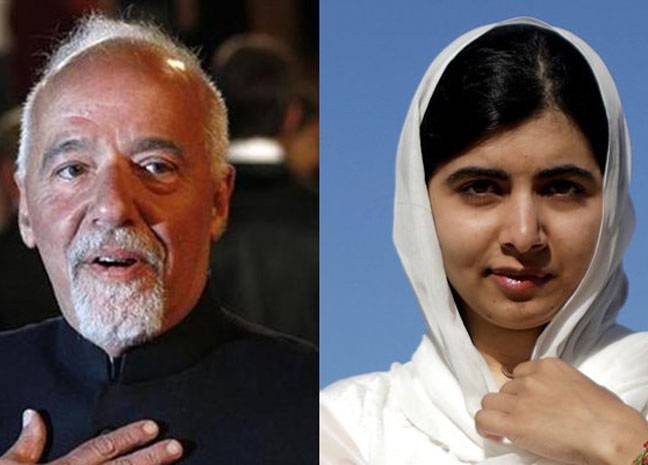RIO DE JANEIRO - Nobel Peace Prize laureate Malala Yousafzai described as “cruel” a policy launched by US President Donald Trump to separate children of illegal immigrants from their families, during her first visit to South America to promote girls’ education.
More than 2,300 children were separated from their parents after the Trump administration began a “zero tolerance” policy on illegal immigrants in early May, seeking to prosecute all adults who cross the border illegally from Mexico into the US. Trump stopped separating families last month following public outrage and court challenges.
“This is cruel, this is unfair and this is inhumane. I don’t know how anyone could do that,” Yousafzai told Reuters on Wednesday. “I hope that the children can be together with their parents.”
Her stern words contrasted with her effusive praise last year for Canada’s embrace of refugees under Prime Minister Justin Trudeau. At the World Economic Forum (WEF) in Davos this year, Malala also questioned Trump’s record on women’s rights.
Yousafzai, known widely by her first name, was visiting Rio de Janeiro to kick off the expansion of her education charity, the Malala Fund, into Latin America, starting with Brazil.
Her aim in Brazil, Latin America’s largest economy, is to advocate for more public spending on education, a tall task after the country passed a constitutional amendment freezing federal spending in real terms for two decades in order to reduce public debt.
She also hopes to get an estimated 1.5 million girls currently not in school into the classroom, with a special focus on minority groups who lag white children on key indicators like literacy and secondary school completion.
“It is important for us to reach the indigenous and the Afro-Brazilian population in Brazil. Those girls are facing many challenges,” Malala said in an interview. In 2014, Malala was made the world’s youngest Nobel laureate, honoured for her work with her foundation, a charity she set up to support education advocacy groups with a focus on Pakistan, Nigeria, Jordan, Syria and Kenya.
The group’s Brazil presence kicked off with a $700,000 three-year grant for three Brazilian female activists focused on education issues. Malala says she hopes to expand elsewhere in Latin America. Earlier this year, the 20-year-old returned home to Pakistan for the first time since a Taliban gunman shot her in the head in 2012 over her blog advocating girls’ education. Weeks ahead of presidential elections in Pakistan, Malala is ruling out politics for herself for now.
“I’m still talking to leaders and ensuring that they prioritize education in their policy,” she said. “It’s easier that way than when you’re on the inside.”
As Pakistan’s adored activist Malala Yousafzai tours Brazil, marking her first visit to Latin America, to kick off the expansion of her education charity, famed author Paulo Coelho tweeted a message of good wishes to her.
“I don’t want to ask anything, but to say loud a clear THANK YOU,” Coelho wrote in response to an #AskMalala activity the women’s rights activist started after she landed in South America.
“You are an example for children, teenagers and adults alike. May your path be blessed,” he wrote.
Malala, like so many other Pakistanis, turned out to be a fan of the Brazilian-born novelist, responding with: “Paulo, your words have inspired me for many years. I am so often asked my favorite book and I always say The Alchemist.
“I’m so honoured to be in your beautiful country,” she wrote.
Her aim in Brazil, the region’s largest economy, is to advocate for more public spending on education — a tall task after the country passed a constitutional amendment freezing federal spending in real terms for two decades in order to reduce public debt. She also hopes to have an estimated 1.5 million girls return to the classroom, with a special focus on minority groups that lag behind white children on key indicators like literacy and secondary school completion.
The young change leader also had a lot of other good advice.
Stressing that young women should focus on their lives instead of growing up faster than their male counterparts, she said: “Girls should tell their leaders what they need to achieve their goals and continue using their voices until they are heard. Never give up.”
She also informed her followers that she had a meeting with “girl footballers on the beach” in Brazil’s capital.
“They tell me that sport helps them deal with difficulties in their lives and gives them confidence. We should support women athletes so girls have more role models. To another fan, she spoke about her time in the Latin American country. “I loved Salvador! We spent a great time walking the streets, meeting people, learning about their stories and listening to incredible music,” she wrote.
But even she was not spared from the FIFA World Cup mania when a user asked how she felt “about England losing the World Cup” because apparently, “the people need to know”.
She only responded with very disappointed and crying-face emojis.
Malala, who, in 2014, was made the world’s youngest Nobel laureate for her work with her foundation, returned home to Pakistan earlier this year for the first time since a Taliban gunman shot her in the head in 2012 over her blog advocating girls’ education.






